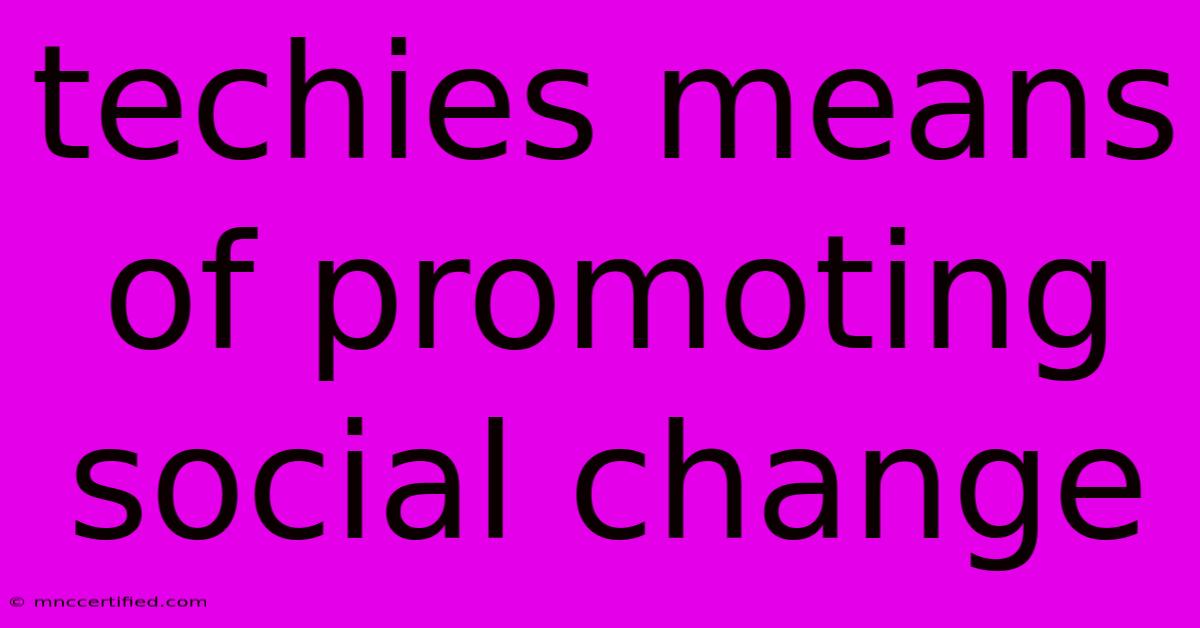Techies Means Of Promoting Social Change

Table of Contents
Techies as Agents of Change: How Technology Fuels Social Impact
Technology is often seen as a force of disruption, but its potential for good is immense. In the hands of passionate techies, it can become a powerful tool for social change, tackling some of the world's most pressing issues. This article will explore how techies are leveraging their skills and resources to promote positive social change, highlighting various avenues and innovative approaches.
1. Building Platforms for Advocacy and Awareness
Social Media: Techies play a critical role in building platforms that empower communities to connect, share information, and advocate for change. Social media platforms, particularly those designed for specific causes, have proven instrumental in organizing protests, spreading awareness about social issues, and mobilizing people for action.
Online Petitioning: Platforms that allow users to create and sign online petitions have been a vital tool for citizen engagement. Techies have built platforms that simplify the petition process, enabling individuals to voice their concerns on a variety of social issues and pressure decision-makers for change.
Data Visualization and Storytelling: Data can be a powerful tool for storytelling and driving social change. Techies are utilizing their skills in data visualization and storytelling to create compelling narratives around social issues, making complex information more accessible and impactful.
2. Developing Innovative Solutions for Social Problems
Mobile Technology for Healthcare: Techies are leveraging mobile technology to improve healthcare access, particularly in underserved communities. Mobile clinics, telemedicine platforms, and health information apps are enabling healthcare professionals to reach more people and provide better access to essential services.
Education and Learning Platforms: Online learning platforms have democratized access to education, bridging the gap between traditional classrooms and remote learners. Techies have developed platforms that offer free courses, resources, and tools, enabling individuals to learn new skills and gain access to opportunities.
Financial Inclusion: Techies are working to bridge the financial gap by developing accessible financial services. Mobile money platforms, microfinance initiatives, and digital banking services are providing financial inclusion to people who traditionally lack access to banking services.
3. Fostering Transparency and Accountability
Open Data and Citizen Journalism: Techies are championing open data initiatives and citizen journalism platforms. By making data publicly accessible, techies are promoting transparency and empowering citizens to hold institutions accountable.
Blockchain Technology for Social Impact: Blockchain technology is revolutionizing social impact initiatives by providing secure, transparent, and auditable systems. It can be used to track donations, manage supply chains, and ensure transparency in aid distribution.
4. Creating Inclusive and Accessible Technology
Adaptive Technology for Accessibility: Techies are developing adaptive technology solutions to improve the accessibility of technology for people with disabilities. This includes screen readers, speech recognition software, and assistive devices that empower individuals with disabilities to participate fully in society.
Open-Source Software Development: The open-source movement promotes collaboration and accessibility. Techies contribute to open-source projects, making technology accessible to a wider audience, including those in developing countries.
Conclusion
The role of techies in promoting social change is undeniable. Their skills and ingenuity are creating new possibilities for addressing social issues, empowering individuals, and building a more equitable and just world. As technology continues to evolve, it's essential for techies to remain committed to using their power for good, ensuring that innovation serves the needs of all.
Keywords: Techies, social change, technology, social impact, advocacy, awareness, online platforms, mobile technology, healthcare, education, financial inclusion, transparency, accountability, open data, citizen journalism, blockchain, accessibility, open-source software, innovation.

Thank you for visiting our website wich cover about Techies Means Of Promoting Social Change. We hope the information provided has been useful to you. Feel free to contact us if you have any questions or need further assistance. See you next time and dont miss to bookmark.
Featured Posts
-
Chapman Insurance Group Port Charlotte Fl
Nov 07, 2024
-
Andrew Marcus Nc Commissioner Of Insurance
Nov 07, 2024
-
Capitals Jingle Bell Ball Back On Itv
Nov 07, 2024
-
1000 Ethereum Investment 5 Years Ago The Results
Nov 07, 2024
-
Insurance Coverage For Liquidated Damages
Nov 07, 2024